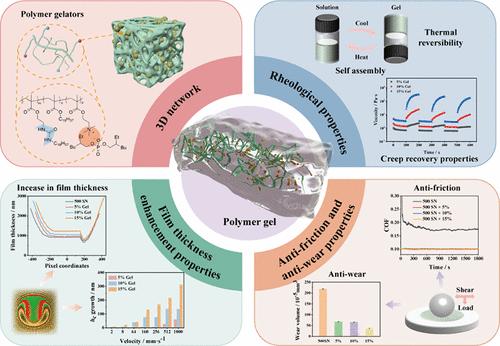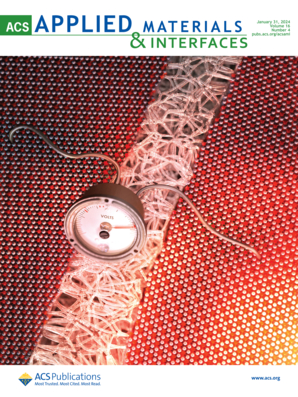Novel Polymer Gel Lubricant Functionalized with a Phosphate Anion for Friction Reduction and Film Thickness Enhancement in Multiple Lubrication Conditions
IF 8.3
2区 材料科学
Q1 MATERIALS SCIENCE, MULTIDISCIPLINARY
引用次数: 0
Abstract
In this study, a supramolecular polymer gelator functionalized with a phosphate anion, PMUS-P, has been successfully synthesized through radical polymerization, and its physicochemical, rheological properties and tribological performance were carefully evaluated as a gel lubricant formed through non-covalent self-assembly in 500SN base oil. The results showed that the gel has a dense network structure, providing excellent stability and mechanical strength. Additionally, the PMUS-P gel exhibits good shear-thinning behavior and excellent creep recovery, effectively avoiding the volatility of lubricants. Under a steel–steel contact, the PMUS-P gel showed excellent tribological performance in long-term wear tests and a high-load, high-frequency, or high-temperature condition. For instance, in long wear tests, the 15 wt % PMUS-P gel showed a 44.90% reduction in average coefficient of friction (COF) compared to 500SN base oil, along with an 88.05% decrease in wear. The lubrication mechanism study revealed that the chemical reactive film formed by friction played a key role in reducing friction and wear, preventing the friction pairs from direct contact. In terms of film-forming properties, the PMUS-P gel demonstrates superior lubrication performance in comparison to 500SN base oil, achieving higher film thickness. Given these advantages, the PMUS-P gel has significant potential for prolonging machinery service life and reducing operational energy consumption, promising to become a new high-performance lubricant.

求助全文
约1分钟内获得全文
求助全文
来源期刊

ACS Applied Materials & Interfaces
工程技术-材料科学:综合
CiteScore
16.00
自引率
6.30%
发文量
4978
审稿时长
1.8 months
期刊介绍:
ACS Applied Materials & Interfaces is a leading interdisciplinary journal that brings together chemists, engineers, physicists, and biologists to explore the development and utilization of newly-discovered materials and interfacial processes for specific applications. Our journal has experienced remarkable growth since its establishment in 2009, both in terms of the number of articles published and the impact of the research showcased. We are proud to foster a truly global community, with the majority of published articles originating from outside the United States, reflecting the rapid growth of applied research worldwide.
 求助内容:
求助内容: 应助结果提醒方式:
应助结果提醒方式:


